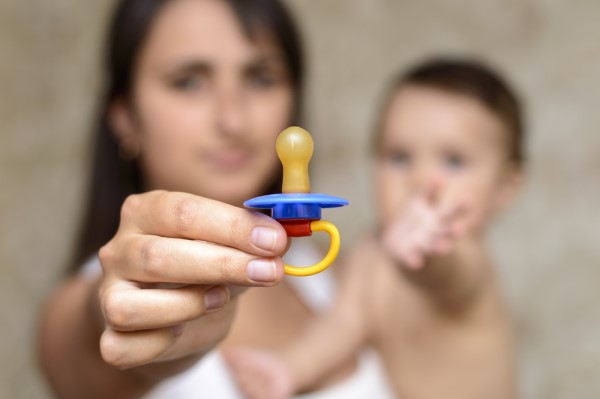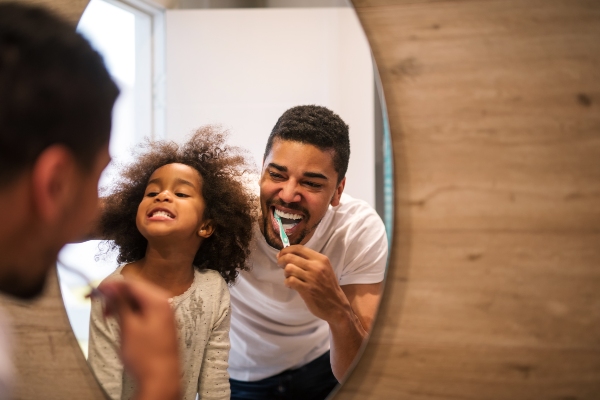Do Pediatric Dentists Discourage Using Pacifiers With Your Baby?

Through extensive education and advanced technology, pediatric dentists recognize the risks associated with pacifiers. Parents have long depended on “binkies” as a way of keeping a child calm. Pacifiers prevent crying in public, help with the teething process and encourage sleep. Therefore, they have become a lifesaver for many moms and dads. However, in speaking with your child’s pediatric dentist, they will likely discourage this practice.
What parents should know about pacifiers
When it comes to pacifiers, parents can now choose from hundreds of different sizes, shapes, styles, and colors. Some pacifiers feature a parent’s favorite sports team, the infant’s name, or a cool design. However, while binkies might seem harmless, there are some genuine concerns. No matter how well-made a pacifier is, a pediatric dentist will likely discourage its use.
The primary concern has to do with oral health. Similar to a baby who sucks on a bottle, using a pacifier can cause an array of problems. Not only can this affect the teeth but also the jaw and muscle formation. Following are some key factors to think about before going the pacifier route:
Malocclusion is a big risk. With this, a child has improperly aligned teeth when they close their mouth. Although this impacts small infants, it becomes increasingly more evident in children who use pacifiers after the age of three. If not corrected, a child can develop a variety of dental health issues. This can affect both chewing and speech.
Sucking on a pacifier can also lead to an infection of the mouth. If parents do not properly clean and sterilize the pacifier, it can become colonized with Candida and other bacterial organisms. Of the greatest concern is the use of latex to make the pacifiers. Even when parents go through the process of cleaning and sterilizing, there is still some degree of risk.
While this one might sound strange, babies who use pacifiers are at a greater risk for developing otitis media. This means reflux of secretions that go into the middle ear. In fact, if a child experiences an altered dental structure, there is a chance for the Eustachian tube to become dysfunctional. As a pediatric dentist explained, parents should not give a pacifier to a baby in order to prevent otitis media.
A fascinating and controversial topic has to do with pacifiers making it difficult to wean off a baby from breast milk. Some mothers turn to a pacifier as a way of making the transition easy. However, it does not appear that it helps much. Many mothers believe giving babies a pacifier only makes them more agitated rather than calming them down.
The ideal time to wean from the pacifier
Studies show that a pacifier increases a baby’s risk of SIDS (sudden infant death syndrome). That is why a pediatric dentist recommends stopping the use of pacifiers at two to four years old. Weaning from the pacifier at age three is ideal. This lowers the child’s risk of developing malocclusions. Some doctors encourage weaning out the pacifier at six months. This can lower the baby’s risk of developing ear infections.
Ways to wean off the pacifier
A parent must pay attention whenever the baby is sucking. Seeing the reason for sucking is important. This can tell the parent if the baby is sucking out of boredom, fear, or contentment. Offering another activity, such as playing with a rattle or a mobile, or offering a teething ring can also help. If the baby cries when the pacifier is removed, distracting the baby with an activity or a toy can help end the negative experience.
Gentle weaning is important. The parent must do this when the child is distracted by other things. Removing the pacifier when the child is content is also a positive way to do it. Taking away the pacifier when the baby wants to suck may push the child to suck another item, such as a thumb. Substituting the pacifier with a blanket or pillow can make the baby forget about the pacifier. Weaning a child off the pacifier will require strong nerves on the part of the parent.
Listen to the pediatric dentist
For pacifiers, as well as bottles, it is always advisable to listen to your pediatric dentist’s suggestions. As a parent, you want to do everything in your power to give your child a great start in life. That means keeping them physically and mentally healthy, including their teeth. Therefore, consider the risks of pacifier use and talk to your pediatrician and dentist first.
Request an appointment here: https://nettsmiles.com or call Nett Pediatric Dentistry & Orthodontics at (623) 759-7658 for an appointment in our Phoenix office.
Check out what others are saying about our dental services on Yelp: Pediatric Dentist in Phoenix, AZ.
Recent Posts
Regular visits to a pediatric dentist who specializes in young patients are an important part of establishing good oral health practices. Many instances of severe dental conditions in children stem from either a lack of regard for proper hygiene or a lack of knowledge on the proper ways to care for a child's teeth. Check…
Pediatric dental care supports children's health, comfort, and development. Not only does it strive to detect and treat oral health problems early, but it also desensitizes children to dental visits to make each experience more comfortable. This special care and attention can motivate children to take good care of their teeth from a young age.Dental…
Cavity treatment for kids is a chief concern among parents, and for a good reason. Cavities are common in children of all ages. According to the Centers for Disease Control and Prevention, over half of the kids ages 6 to 8 have had at least one cavity in a primary tooth. The good news is…
Pediatric dentistry focuses on the oral problems that occur in children. Many dental issues in kids are similar to those that occur in adults. Without proper treatment, dental problems can progress to misaligned teeth and poor oral health. If you want to maintain your child’s dental health, here are the common dental issues that pediatric…


